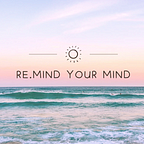7. Things I do when struggling with my own mental health — insights from a clinical psychologist
I’ve been a registered clinical psychologist since 2017. I’ve struggled with my mental health in the past and still do so now and again. Similar to many, these issues started in my early teens — a peak time for a number of changes and stressors, like hormone surges and bodily changes (periods, acne, so much fun), sleep deprivation, changes to social groups, discovering identity and sexuality; it’s a wild ride. It’s probably not surprising then, that the onset of the first mental disorder occurs before age 18 in almost half (48.4%), and before age 25 in more than half (62.5%) of the global population1.
I have done a number of things throughout my life to maintain my mental wellbeing — or at least to avoid a prolonged slump, including years of therapy at different developmental periods of my life. And if I’m truly honest, it’s what motivated me to study psychology and understand why I am the way I am, why my family are the way they are, and how to heal (though I do also care deeply for the wellbeing of others). In retrospect, I don’t think studying at university for 8 years was necessary to learn how to maintain my wellbeing!
There are many things that help me when I’m struggling, and I’m about to share them with you, but first a disclaimer: This is what has worked for me — it’s not meant as tailored professional advice and it’s really important that you discover and design your own self-care plan to work out what works best for you. Also, the list below doesn’t focus on the gold standard evidence-base strategies that will improve your mental and physical health (diet, exercise, and social support) — rather it’s a list of some additional strategies.
1) I try to anticipate and plan for periods where I know I’m likely to struggle and make extra time, and conscious effort, to put self-care first. For instance, when our second Covid-19 lockdown was announced, I made a ‘lockdown mental health care plan’ and updated it weekly. This included a crude table with columns reading “games, crafts, physical movement, Wednesday-night movies, places to explore within 5kms, ‘other’ activities, social connection, spirituality, etc” where I listed as many things as I could under these headings.
2) I use Trello (an app) to list my top ‘healthy’ things that boost my mood. I check in with it every month as a living document, which I add to when I discover new hobbies, practices and rituals that spark a bit of joy; these things will change over time! The best thing about Trello is that it syncs to all of your devises (so if you update something on your phone, it’ll update on your computer etc). Currently on my list:
· Remember to move, sleep, talk, feel, meditate/music, write/reflect
· Salt water/ get underwater
· Mindfulness meditation
· Alan Watts
· Plants/go bush
· Plan trips and holidays
· Just leave the house
3) I have a ‘mindfulness bell’ app on my phone, which I set to ‘random’, so that at multiple points throughout the day I’ll hear a ‘gong’ sound. This is where I’ll check in with how I’m feeling, my stress levels, how long I’ve been sitting stationary for, and take a deep breath. Yep, I’m training myself like one of Pavlov’s dogs, but it becomes an automatic skill pretty quickly so you can increase your presence and awareness of your mind/body.
4) There are also another bunch of lists on my phone relating to personal insights, goals, and quotes to read when I’m experiencing existential crises. I must have an obsession with lists…
I hope this short list-of-lists can provide you with some ideas or validation perhaps. I think the takeaway here is that what works to improve your mental health — apart from the essentials of diet, exercise, and social support — will be slightly different for each individual and require frequent modifications throughout our lives and we grow and change.
[1] Solmi, M., Radua, J., Olivola, M., Croce, E., Soardo, L., de Pablo, G. S., … & Fusar-Poli, P. (2021). Age at onset of mental disorders worldwide: large-scale meta-analysis of 192 epidemiological studies. Molecular psychiatry, 1–15.
